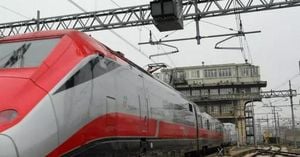Angela Merkel’s take on Brexit has been nothing short of emotional, as revealed in excerpts from her upcoming autobiography titled Freedom. The former German chancellor describes the aftermath of the Brexit referendum—when the United Kingdom decided to leave the European Union—in stark terms. She said it tormented her and called the whole situation a "humiliation, a disgrace" for the EU. Indeed, her reflections highlight both her personal turmoil and the broader consequences of Brexit.
Set to be published soon, Freedom contains about five pages dedicated to Brexit, in the wider narrative of her 700-page memoir. Merkel’s introspection reveals how she grappled with the outcome and how she wished she could have done more to assist then-British Prime Minister David Cameron during the turbulent negotiations to keep the UK within the EU. Her feelings of despair are particularly poignant, considering she perceived the result as not merely national but as something affecting the integrity and unity of the EU.
Merkel wrote, "To me, the result felt like a humiliation, a disgrace for us, the other members of the European Union—the United Kingdom was leaving us in the lurch. This changed the European Union in the view of the world; we were weakened.” This statement encapsulates her view of Brexit not just as the choice of one member state, but as something fundamentally damaging to the collective identity and strength of the European bloc.
The roots of her dismay can be traced back to Cameron’s political decisions, which she reflected upon. She recalled the moment back in 2005 when Cameron suggested Conservative Party MEPs detach from the European People’s Party over the support of the Lisbon Treaty. It was during this turbulent period where Merkel sensed the potential for Brexit brewing and undoubtedly attributed part of the blame to Cameron. She concluded, “He… put himself in the hands of those who were sceptical about the European Union and was never able to escape this dependency.” This thought alludes to the complex intertwining of domestic politics and broader EU dynamics, which played a pivotal role leading to the referendum.
Her memoir also weaves through the timeline of events leading to the referendum, including her interactions with Cameron as he desperately sought to negotiate reforms related to freedoms of movement and standards of trade. She was unflaggingly supportive, even at personal political risk. "My support of him rendered me an outsider with my other colleagues," she candidly mentioned, reflecting on the tensions surrounding the summit of EU leaders where agreements were sought.
Merkel’s reflections spotlight the inherent conflicts within EU governance during times of crisis. During one pivotal evening at the EU summit, she recalled remaining by Cameron’s side as tensions boiled over; her presence was intended to bolster his position and stave off his political isolation among EU leaders. That's quite the responsibility to bear, especially with the Eurozone crisis lurking as well!
Yet, Merkel also noted the points when she could no longer assist. She pointed out the UK's failures to control the influx of workers from Eastern Europe following their accession to the EU. It led to political strife, particularly with the Eurosceptics gaining momentum over perceived negative impacts of freedom of movement on the British workforce. Merkel stated, "The UK had not helped itself by making the mistake of not introducing restrictions on eastern European workers once 10 new countries joined the bloc… This gave Eurosceptics the chance to put freedom of movement in negative light.” This narrative portrays the political dance of accommodating immigration with the realities on the ground for voters, all under the shadow of EU regulations.
While Merkel played the part of the supportive ally, she couldn’t ignore the shifting dynamics. She acknowledged the strategic choices made by the UK, especially Cameron's decision to pull away from the European People’s Party, which she saw as paving the road to Brexit. She concluded, "Brexit… demonstrated... the consequences... when there’s a miscalculation from the very start,” solidifying her argument about the long-term consequences of short-term political decisions.
After the referendum's outcome, feelings of remorse surfaced for Merkel. She tortured herself with thoughts about whether greater concessions might have kept the UK within the EU folds. Despite this self-reproach, she reluctantly came to the conclusion: "Even with the best political will, mistakes of the past could not be undone.” This encapsulates her struggle, torn between personal guilt and the harsh reality of political decisions made long before her involvement.
Her memoir is not just about her thoughts on Brexit; it serves as commentary on leadership, accountability, and the complex interplay of national interests and collective solidarity. Merkel's narrative asks—what does it mean to truly lead, and how do the actions of one leader affect the broader community?
Overall, the insights shared by Merkel offer more than just insights about Brexit—they open doors to discussions on collective governance's fragility and the consequences of political choices on larger global stages. The reflections resonate emotionally, shedding light on the challenges political leaders face when attempting to balance national interests with those of broader alliances. With so much at stake, it becomes clear how intertwined the personal and political realms can be.
It is this balance of power and responsibility, the weight of history, and the future of international relations, which underpin Merkel's reflections on Brexit. The world watches closely as political decisions continue to shape the fabric of international community.



